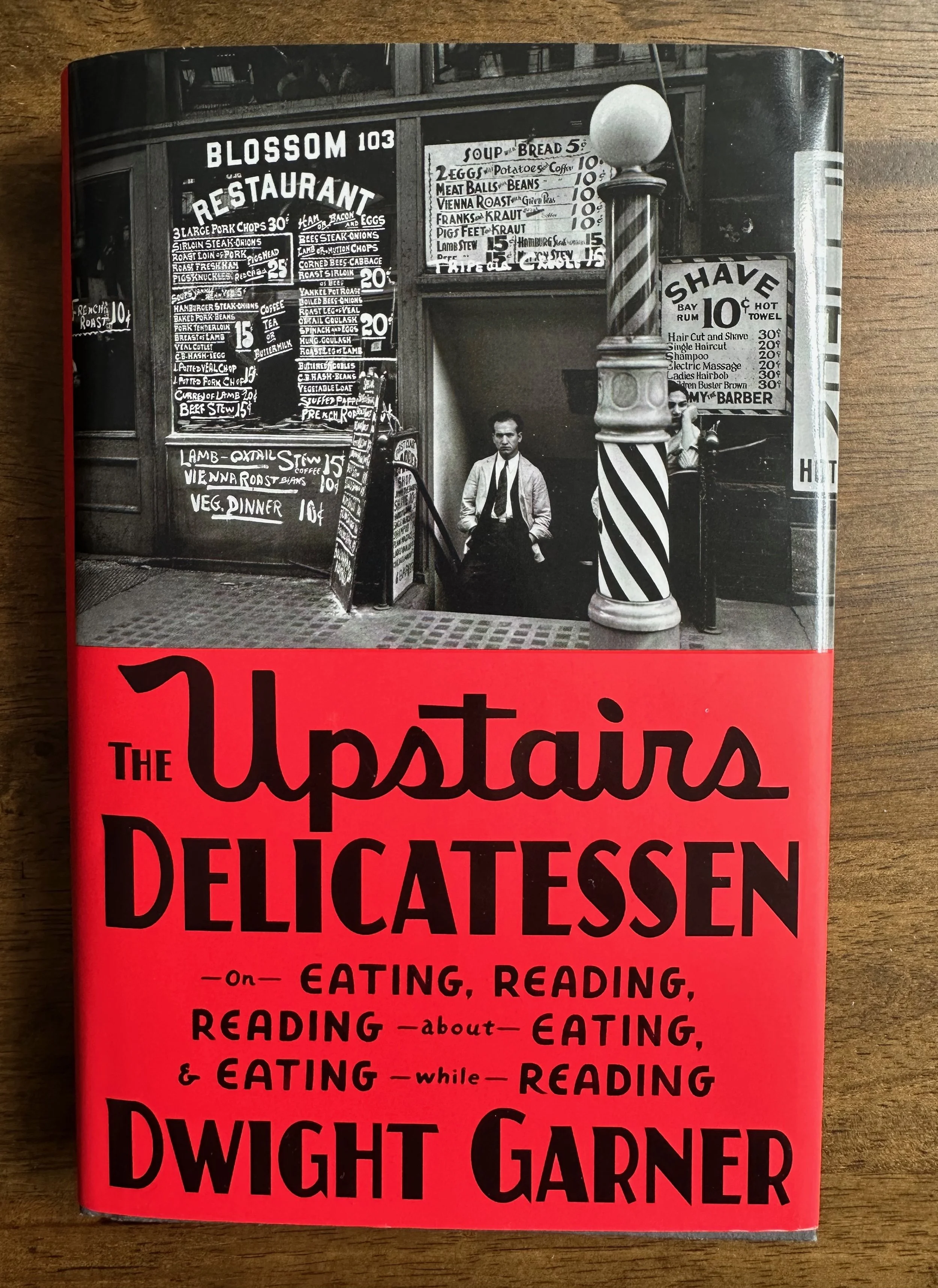FOOD BYTES IS A (ALMOST) MONTHLY BLOG POST OF “NIBBLES” ON ALL THINGS CLIMATE, FOOD, NUTRITION SCIENCE, POLICY, AND CULTURE.
Well…the semester is over, and Columbia went out with a bang. Despite the chaos and heartbreaking controversy that has ensued on campus, I must say that I thoroughly enjoyed teaching this semester and getting to know all the Climate and Society Masters students at Columbia’s Climate School. What a pleasure and privilege it is to interact every day with the next generation of thinkers, leaders, and revolters. Teaching is all-consuming if you want to do right by the student. Thus, my blogging has been less frequent, and I missed the April Food Bytes. I don’t think I need any excuses as to why. But I did manage to get in a bit of reading, listening, and watching. Check out some Bytes that I consumed…
I read The Upstairs Delicatessen: On Eating, Reading, Reading About Eating, and Eating While Reading by Dwight Garner in just a few days. If you love literature and consider yourself a gourmand, Garner nicely meshes the two worlds with humor and personal tidbits about his life. What a pleasure to read about his obsession with both food and books. I like this quote by the New York Times (which must have been strange for this reviewer to write, being that Garner is the book critic for the NYT), “Garner’s early appetite for everything from Bugles to blue crabs was matched by his equally wide-ranging appetite for literature, encompassing Miami Herald sports columns, scavenged copies of Oui magazine and the novels of Robert B. Parker.”
I listened to an eight-part series podcast, Fiasco, about the beginnings of the AIDS epidemic in America. It focuses on: “the early years of the crisis when a diagnosis was tantamount to a death sentence. It looks at the mystery and missteps around identifying and treating a new, contagious disease, and what it took to get the public — and the government — to care.” While nothing related to food, it is such a fantastic and profoundly moving series that highlights the importance of engaging and mobilizing communities to advocate for their rights, particularly those who have been stigmatized and marginalized. It is a story of constancy. The food systems world could learn and adopt many lessons from this historic movement and what it means to fight for a cause when it threatens the very existence of life.
A few interesting reports have emerged and are worth the read. I will highlight three. First, the International Panel of Experts on Sustainable Food Systems (IPES-Food) published Land Squeeze. The report focuses on how farmland is being purchased for the purposes of what is called "green grabbing,” but they argue it is resulting in massive land inequities (see figure below). Much of the land is being used for extractive industries rather than agriculture. IPES-Food has become known for its criticism of the “go big or go home” approach to food systems, and I don’t blame them. The concentration of power is scary, to say the least, and frankly, I am not sure if we will see an end to this consolidation. Are there any examples of where David won against Goliath? Tobacco is one example — maybe — and some of the lessons on how to stymy the tobacco industry can be used in food systems, but at the same time, they are very, very different in scale, scope, and outcome. I will write about this more in a coming blog post on The Food Archive.
The second report, the World Resource Institute’s Towards Better Meat, is a fantastic report unpacking the pros and cons of organic, grass-fed, and conventional production of meat. [I am also a massive fan of Richard Waite. He was one of my favs to follow when I was on the good ol’ days of Twitter/X. Alas, Elon squashed all that.] In their analysis, they compare these management practices across a range of environmental, social, and economic factors across different animal systems - comparing chicken and eggs, beef, and other animal foods. Bottomline? Benefits depend on what outcome one is looking at and which animal system. Check out the figure below. It looks at “total carbon costs,” which include on-farm emissions as well as carbon opportunity costs. Interestingly, grass-fed, organic, and free-range beef and dairy production systems had higher overall climate impacts per gram of protein than conventional systems in more than 90% of cases. The WRI makes the claim that this is because of higher land use requirements. The whole report weighs these different outcomes and each system has strengths and trade-offs. There is no “silver bullet” system, sorry to say.
The last report is the World Bank’s Recipe for a Livable Planet. It is their answer to the various 1.5-degree roadmaps emerging. If FAO did one, why can’t they? Yet, why do I feel the World Bank is always two steps behind… One interesting message that you hear less about, but the Bank did some analysis, is that 3/4 of food system emissions come from low-and middle-income countries, including 2/3 from middle-income countries (see figure below). They argue that “mitigation action has to happen in these countries as well as in high-income countries to make a difference.” They argue for three actions: repurposing subsidies to encourage low emissions, (2) using digital technologies to improve information for measurement and reporting, and (3) leveraging institutions that include smallholder farmers, women, and Indigenous groups, “who are at the front lines of climate change.” Nothing too new here in these recommendations, but I am sure there will be some controversies kicked up with regard to middle-income countries needing to accelerate their mitigation potentials.
That’s all for now folks. I hope everyone has a relaxing and safe summer. It’s going to be a scorcher. I leave you with my Summertime Sadness playlist to breeze and eaze you into this cruel summer.


